Universal Technical Institute Bundle
How Did Universal Technical Institute Rise to Prominence?
From a single auto repair school in 1965 to a national leader in technical education, the story of Universal Technical Institute (UTI) is one of remarkable growth and adaptation. Founded with a clear mission to address the need for skilled technicians, UTI has consistently evolved to meet the demands of a changing job market. Discover how this institution transformed from its humble beginnings into a major player in vocational training.
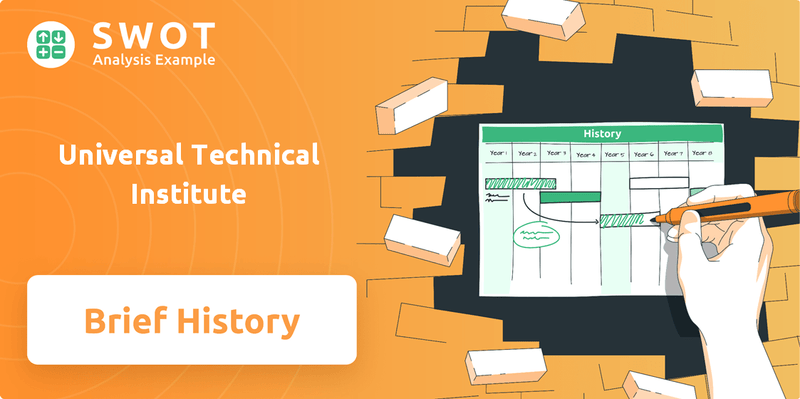
Universal Technical Institute's journey, marked by strategic expansion and a commitment to hands-on training, reflects its ability to identify and capitalize on emerging industry trends. Exploring the Universal Technical Institute SWOT Analysis can provide valuable insights into the company's strengths, weaknesses, opportunities, and threats. Understanding the UTI company's milestones and its impact on vocational training helps to understand the company's current position in the market.
What is the Universal Technical Institute Founding Story?
The story of the Universal Technical Institute (UTI) began in 1965 in Phoenix, Arizona. Robert I. Sweet, the founder, saw a gap in the market for skilled trades training, specifically in automotive repair. His vision was to provide quality education to elevate the profession, which was often overlooked at the time.
Sweet, a graduate of the State University of New York at Oswego, started with a small class of just five students focused on automatic transmissions. This marked the beginning of what would become a significant player in vocational training. The early focus was on hands-on automotive repair, a field ripe for skilled professionals.
The Marketing Strategy of Universal Technical Institute has evolved over time. It started with a single building and a focused curriculum.
UTI was founded in 1965 by Robert I. Sweet in Phoenix, Arizona. Sweet recognized the need for skilled automotive technicians.
- The initial program focused on automatic transmission repair.
- By 1968, UTI expanded to include automotive and diesel repair programs.
- Air conditioning and heating repair training was added in 1969.
- The company's early growth was fueled by industry demand and the increasing complexity of automotive technology.
The early days of UTI were marked by rapid expansion. Within three years of its founding, the company added automotive and diesel repair programs. This quick response to industry needs was a key factor in its early growth. The cultural context of the mid-1960s, with a growing demand for skilled trades, provided a fertile ground for UTI's establishment and growth.
Universal Technical Institute SWOT Analysis
- Complete SWOT Breakdown
- Fully Customizable
- Editable in Excel & Word
- Professional Formatting
- Investor-Ready Format
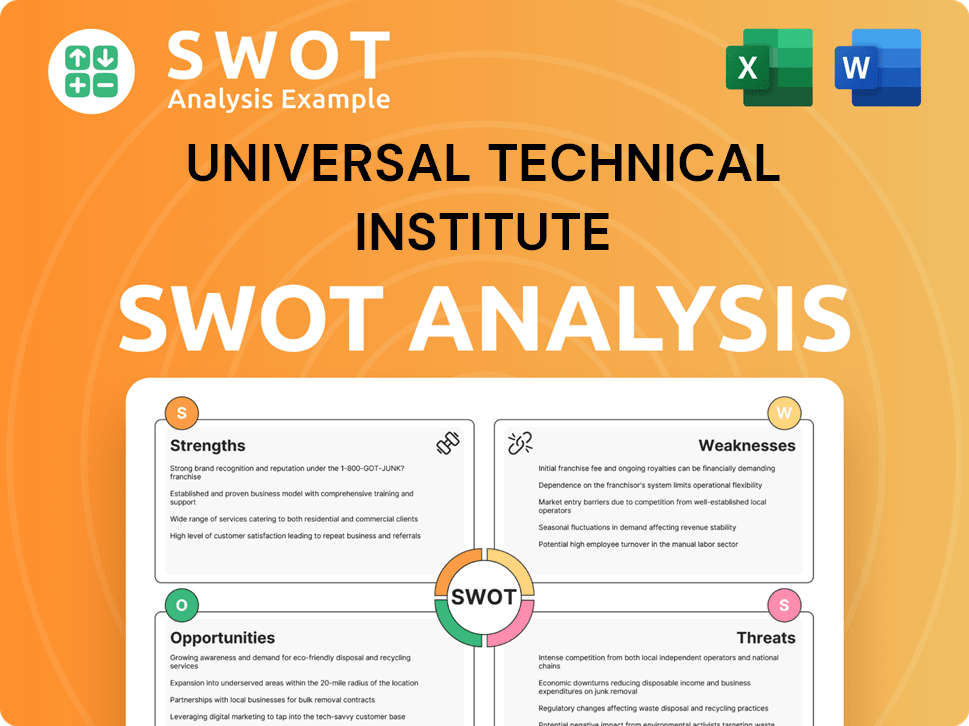
What Drove the Early Growth of Universal Technical Institute?
The early years of Universal Technical Institute (UTI) were marked by significant expansion in both program offerings and geographical reach. Starting with a focus on automotive repair, the company quickly diversified into related fields. This period saw the establishment of new campuses and strategic acquisitions, laying the groundwork for its future growth.
In 1968, UTI expanded its programs to include automotive and diesel repair, followed by air conditioning and heating repair in 1969. The Custom Training Group was established in 1980 to provide on-site instruction for corporate technicians, marking an early venture into corporate training. The first major expansion outside of Phoenix occurred in 1983 with a campus in Houston, Texas, focusing on automotive and diesel technology.
The 1990s saw continued growth, including a campus in Rancho Cucamonga, California, in 1998. A significant milestone was the 1998 acquisition of Clinton Harley Corporation, which included the Motorcycle Mechanics Institute (MMI) and Marine Mechanics Institute (MMI), for $26.3 million. This, along with the acquisitions of National Technology Transfer, Inc. (NTT) and Performance Training Associates (PTA) for approximately $50.2 million, significantly diversified the company's offerings. By 1999, revenues topped $78 million, reflecting the company's expansion and diversification efforts.
Robert Hartman became CEO in 1990, implementing a strategy that included adding a board of directors, which helped boost enrollment. By 1995, UTI was training approximately 4,000 students annually. The company went public in December 2003 through an initial public offering (IPO), raising $60.1 million. This capital supported further expansion, including new campuses in Exton, Pennsylvania, Sacramento, California, and Massachusetts.
During this period, UTI continued to address the growing demand for skilled technicians and formed partnerships with major manufacturers like Ford, General Motors, and BMW. These partnerships remain integral to its training programs today. The market reception was generally positive as the company expanded its reach and diversified its programs. For more details on the company's history, you can check out a brief history of Universal Technical Institute.
Universal Technical Institute PESTLE Analysis
- Covers All 6 PESTLE Categories
- No Research Needed – Save Hours of Work
- Built by Experts, Trusted by Consultants
- Instant Download, Ready to Use
- 100% Editable, Fully Customizable
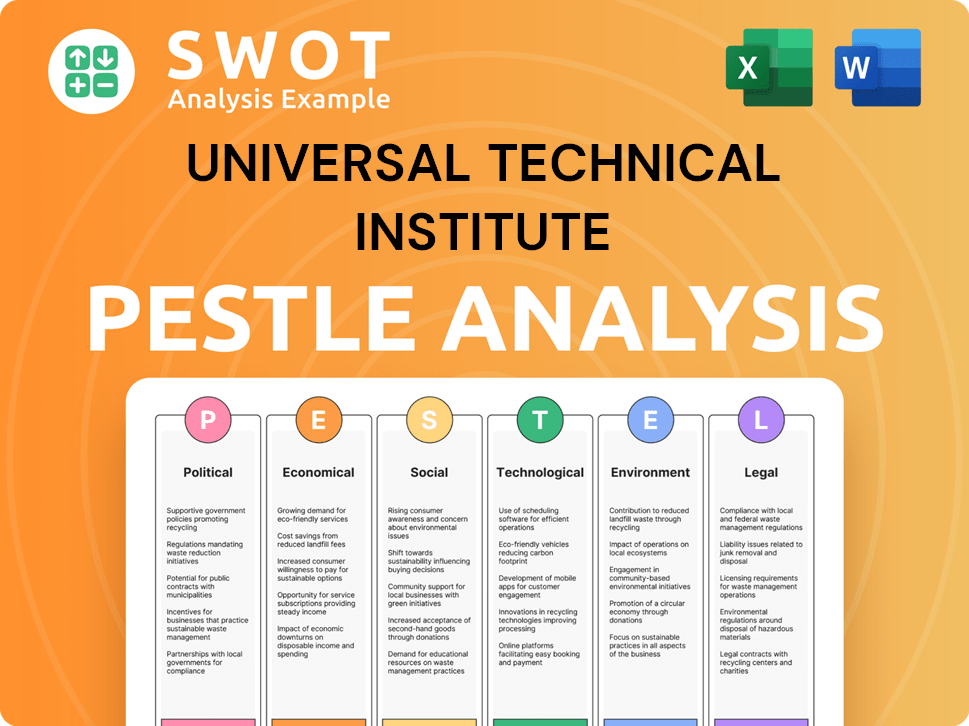
What are the key Milestones in Universal Technical Institute history?
The journey of Universal Technical Institute has been marked by significant achievements and strategic adaptations. From its early days to its current status, the company has consistently evolved to meet the demands of the industry and the needs of its students, making it a prominent player in vocational training.
| Year | Milestone |
|---|---|
| Early 1980s | UTI developed a pioneering training partnership with Harley-Davidson USA, marking an early industry collaboration. |
| 1998 | UTI acquired Motorcycle Mechanics Institute (MMI) and Marine Mechanics Institute (MMI), broadening its specialized training offerings. |
| November 2021 | UTI acquired MIAT College of Technology, expanding into aviation maintenance, wind power, and welding programs. |
| December 2022 | UTI acquired Concorde Career Colleges, Inc., entering the healthcare education sector and diversifying its program portfolio. |
| Fiscal Year 2024 | The Concorde division contributed $246.3 million to UTI's revenue, demonstrating the success of diversification. |
A key innovation has been its industry-led educational model, which includes partnerships with major manufacturers. These collaborations ensure that UTI's programs align with industry needs and provide students with manufacturer-specific advanced training (MSAT) programs and certifications.
UTI has forged partnerships with over 35 leading brands, including BMW, Ford, General Motors, Mercedes-Benz, Toyota, and Porsche. These partnerships guide the curriculum and help recruit graduates.
The focus on manufacturer-specific advanced training (MSAT) programs and certifications sets UTI apart. This ensures that graduates are well-prepared for the workforce.
The curriculum is constantly updated to reflect the latest industry standards and technological advancements. This ensures that students receive relevant and up-to-date training.
Despite its successes, UTI has faced challenges, including fluctuations in student enrollment and regulatory scrutiny. The for-profit education sector faces ongoing changes in government policies, impacting growth plans.
In 2011, UTI had over 18,000 students, but enrollment subsequently declined. This highlights the need for strategic adjustments to attract and retain students.
The for-profit education sector faces ongoing regulatory scrutiny and changes in government policies. These changes can impact growth plans and require careful navigation.
In 2012, tuition at UTI was significantly higher compared to public colleges offering similar programs. This has been a factor in enrollment challenges.
Universal Technical Institute Business Model Canvas
- Complete 9-Block Business Model Canvas
- Effortlessly Communicate Your Business Strategy
- Investor-Ready BMC Format
- 100% Editable and Customizable
- Clear and Structured Layout
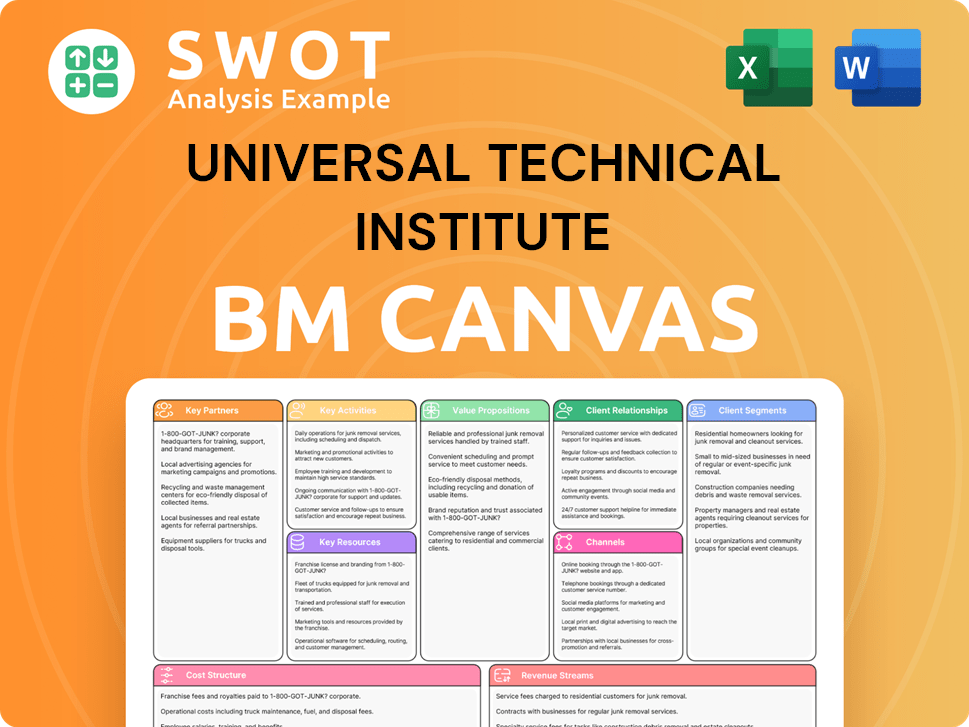
What is the Timeline of Key Events for Universal Technical Institute?
The Universal Technical Institute has a rich history, marked by strategic expansions and adaptations to meet industry demands. Founded in 1965 by Robert I. Sweet in Phoenix, Arizona, the company initially focused on automotive training. Over the years, it broadened its curriculum to include diesel repair, air conditioning, and heating, and later expanded into motorcycle, marine, and corporate training through acquisitions. Becoming a public company in 2003, the company continued to open new campuses and diversify its offerings, most recently entering the healthcare education sector.
| Year | Key Event |
|---|---|
| 1965 | Robert I. Sweet founded Universal Technical Institute in Phoenix, Arizona, with an automotive curriculum. |
| 1968 | Automotive and diesel repair programs were added to the curriculum. |
| 1969 | Air conditioning and heating repair training was introduced. |
| 1980 | The Custom Training Group was created to provide on-site instruction for corporate technicians. |
| 1983 | UTI opened its second campus in Houston, Texas. |
| 1988 | A campus opened in Glendale Heights, Illinois (later moved to Lisle in 2013). |
| 1998 | UTI acquired Clinton Harley Corporation (including MMI) and National Technology Transfer, Inc. (NTT), expanding into motorcycle, marine, and corporate training. |
| 2003 | UTI became a public company through an Initial Public Offering (IPO). |
| 2004 | New campuses opened in Exton, Pennsylvania, and the Phoenix campus relocated to Avondale, Arizona. |
| 2019 | Jerome Grant was named CEO. |
| 2021 | UTI completed the acquisition of MIAT College of Technology. |
| 2022 | UTI acquired Concorde Career Colleges, Inc., entering the healthcare education sector. |
| 2024 | UTI reported $733 million in revenue and $42 million in net income, with a 10% growth in average full-time active students. |
In fiscal year 2024, the company reported $733 million in revenue and a net income of $42 million. The company is projecting revenue to be in the range of $800-$815 million for fiscal year 2025. The company anticipates exceeding $1 billion in revenue by the end of 2029, with adjusted EBITDA margins approaching 20%.
UTI plans to launch nine full-length programs and ten short courses in fiscal year 2025. Three new campuses are slated to open in 2026, including the first Concord-Heartland campus in Fort Myers, Florida, a skilled trades and aviation campus in a Greenfield City, and an optimized UTI campus in a new state. San Antonio is announced as the inaugural site for a skilled trades-focused campus, expected to open in Spring 2026.
UTI is in Phase 2 of its 'North Star Strategy,' focusing on accelerating growth, diversification, and optimization. The company plans to launch a minimum of six new programs annually at existing campuses starting in fiscal year 2025 and open at least two new campuses each year between fiscal years 2026 and 2029. Strategic acquisitions, particularly in healthcare, are a key part of the strategy.
The company is optimistic about the growing demand for 'skilled collar' professionals. Positive macroeconomic trends and increasing student interest in practical education are viewed as strong tailwinds. The focus remains on providing quality education for in-demand careers, continually adapting to the evolving needs of various industries, including automotive, diesel, and healthcare.
Universal Technical Institute Porter's Five Forces Analysis
- Covers All 5 Competitive Forces in Detail
- Structured for Consultants, Students, and Founders
- 100% Editable in Microsoft Word & Excel
- Instant Digital Download – Use Immediately
- Compatible with Mac & PC – Fully Unlocked
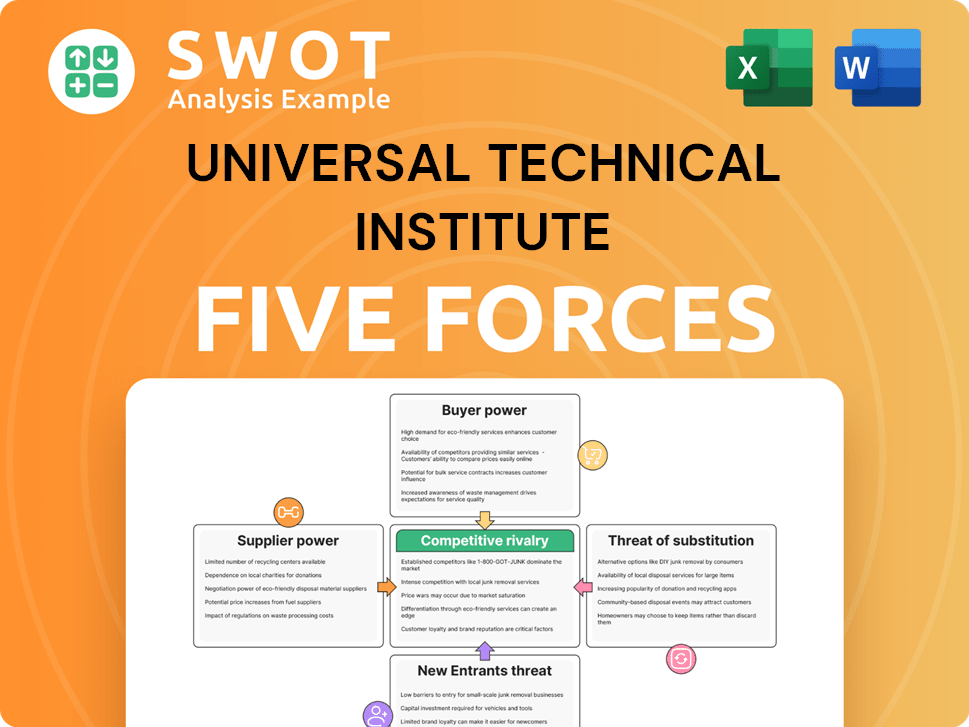
Related Blogs
- What is Competitive Landscape of Universal Technical Institute Company?
- What is Growth Strategy and Future Prospects of Universal Technical Institute Company?
- How Does Universal Technical Institute Company Work?
- What is Sales and Marketing Strategy of Universal Technical Institute Company?
- What is Brief History of Universal Technical Institute Company?
- Who Owns Universal Technical Institute Company?
- What is Customer Demographics and Target Market of Universal Technical Institute Company?
Disclaimer
All information, articles, and product details provided on this website are for general informational and educational purposes only. We do not claim any ownership over, nor do we intend to infringe upon, any trademarks, copyrights, logos, brand names, or other intellectual property mentioned or depicted on this site. Such intellectual property remains the property of its respective owners, and any references here are made solely for identification or informational purposes, without implying any affiliation, endorsement, or partnership.
We make no representations or warranties, express or implied, regarding the accuracy, completeness, or suitability of any content or products presented. Nothing on this website should be construed as legal, tax, investment, financial, medical, or other professional advice. In addition, no part of this site—including articles or product references—constitutes a solicitation, recommendation, endorsement, advertisement, or offer to buy or sell any securities, franchises, or other financial instruments, particularly in jurisdictions where such activity would be unlawful.
All content is of a general nature and may not address the specific circumstances of any individual or entity. It is not a substitute for professional advice or services. Any actions you take based on the information provided here are strictly at your own risk. You accept full responsibility for any decisions or outcomes arising from your use of this website and agree to release us from any liability in connection with your use of, or reliance upon, the content or products found herein.